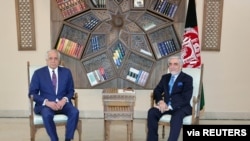The United States said Monday its special envoy to Afghanistan has completed a “productive” four-day visit to the war-torn nation, where he discussed preparations for the upcoming Afghan peace conference hosted by Turkey.
A U.S. Embassy statement in Kabul said Ambassador Zalmay Khalilzad met with Afghan government and political leaders, as well as civil society activists, among others, during his trip.
Khalilzad visited the Afghan capital after holding talks with Taliban leaders in Doha, Qatar, where the insurgent group maintains its political office.
Proposed Istanbul conference
The U.S.-proposed multinational conference is tentatively set for later this month in the Turkish city of Istanbul, though no formal date has been announced.
The conference is being arranged to facilitate an end to months of deadlock in peace negotiations between the Afghan government and the Taliban.
But prospects of an enduring power-sharing deal between the two adversaries to end the 20-year-old war in Afghanistan are slim.
“Ambassador Khalilzad underscored why it was important both sides accelerate the peace process,” the U.S. Embassy in Kabul said Monday.
“In all his meetings, Ambassador Khalilzad was encouraged by the shared vision for an Istanbul conference that advances prospects for a just and durable peace in Afghanistan,” the statement said.
The U.S. envoy stated that “the full and meaningful” participation of Afghan women and minorities in the peace talks “is essential for any solution to be sustainable.”
Taliban spokesman Mohammad Naeem said Monday his group was still conducting internal consultations and deliberations to decide whether to attend the Turkey conference.
“As soon as a final decision is made, it will be shared with the public,” Naeem said.
But if the Istanbul conference takes place later this week, the Taliban will not be able to attend for obvious reasons, Naeem said, responding to media reports and statements by some Afghan officials that the multinational conference may be arranged on April 16.
US withdrawal
Meanwhile, the United States is committed to withdrawing the remaining 3,000 troops from Afghanistan by May 1, as stipulated in a deal Washington signed with the Taliban a year ago to wind down what has been the longest U.S. war.
The U.S.-Taliban agreement also requires around 10,000 troops stationed in the country under a NATO-led noncombatant military alliance to leave by the May deadline.
U.S. President Joe Biden’s national security team has been reviewing the pact amid concerns a foreign troop withdrawal in the absence of a peace deal among Afghan rivals could intensify bloodshed and chaos in the South Asian nation.
Biden, however, said last month it will be tough for the United States to meet the drawdown deadline for logistical reasons. The Taliban responded by warning if foreign troops do not exit Afghanistan by the agreed-upon date, insurgent attacks on U.S. troops will resume.
“He has been clear — publicly, I think — that it is operationally challenging to get troops out by May 1st. But I certainly expect you will hear from him on what his decision is in advance of that period of time,” White House press secretary Jen Psaki said last Friday. “But the president’s commitment is to bringing a responsible end to the conflict, removing our troops from harm’s way and ensuring that Afghanistan can never again become a haven for terrorists that would threaten the United States or any of our allies.”
Interim Afghan government?
Meanwhile, the Biden administration has proposed an interim Afghan government, including the Taliban, to hold power in Kabul until elections can be held, meaning Afghan President Ashraf Ghani will have to step down.
But Ghani has rejected the proposal and offered a counterproposal. The Ghani plan calls for a comprehensive cease-fire, a transitional “government of peace” and new elections in which neither he nor other current government officials will run.
The Taliban has rejected both plans and insists all foreign troops must leave Afghanistan in line with the group’s deal with the U.S., leaving it for Afghans themselves to decide on establishing an “Islamic government” in the country.
A commentary published on the Taliban’s official website on Sunday dismissed the idea of power-sharing with the Ghani administration.
It dismissed as “delaying tactics” reported assertions that the Biden administration wants to negotiate with the Taliban a six-month extension to the troop withdrawal deadline.
“If they should violate the agreement, then war will be renewed. Any deal made with the Taliban regarding a six-month extension is also of no benefit,” according to the insurgent commentary.
U.S. Secretary of State Antony Blinken cautioned the Taliban against trying to militarily regain power in Afghanistan.
“If the Taliban, for example, wants recognition, if they want international support, if they are part of some kind of new government going forward in Afghanistan, that can’t happen. That support won’t be there,” he told NBC News’ “Meet the Press” Sunday news show.
(VOA's Ayesha Tanzeem contributed to this story.)





